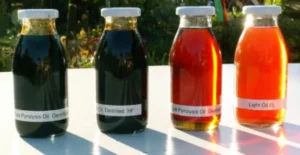The emerging role of rubber-derived unrefined pyrolysis oil in Europe’s circular economy
Pune, India – In a recent Future Market Insight blog by Nikhil Kaitwade, Associate Vice President at FMI, Mr. Kaitwade discusses how Europe is at the forefront of sustainability, leveraging innovative approaches to waste management and energy production. One such innovation gaining traction is the use of rubber-derived unrefined pyrolysis oil (RUPO). This oil, produced through the pyrolysis of waste rubber, particularly from end-of-life tires, is emerging as a key component in Europe’s circular economy and sustainable energy initiatives.
Pyrolysis, a process where rubber is heated in the absence of oxygen, results in various products, including gases, carbon black, and pyrolysis oil. RUPO is gaining attention for its potential as a renewable energy source and feedstock for green chemicals. The European market is increasingly adopting this oil to reduce reliance on fossil fuels and minimize environmental impact.
Technological advancements in pyrolysis, such as improved reactor designs, have enhanced the efficiency and yield of RUPO. Fluidized bed reactors and rotary kilns are among the innovations driving this field, leading to higher quality oil that can be further refined into valuable products.
Europe’s commitment to sustainability is reflected in its regulatory frameworks supporting the use of RUPO. These regulations aim to promote the recycling of waste rubber and the production of renewable energy, aligning with the broader goals of the circular economy.
As Europe continues to embrace these principles, RUPO is set to play a significant role in reducing waste and providing sustainable energy solutions. The ongoing push towards reducing carbon footprints and reliance on fossil fuels makes RUPO a promising alternative in the quest for a greener future.
The versatility of rubber-derived unrefined pyrolysis oil extends beyond energy production. Industries such as manufacturing, automotive, and construction are exploring the use of RUPO as a sustainable alternative to traditional materials. In manufacturing, RUPO can be used as a feedstock for producing synthetic rubber and other polymers, reducing the need for virgin raw materials.
In the automotive industry, RUPO is being tested as a component in biofuels, offering a cleaner alternative to conventional fuels. This not only helps in reducing greenhouse gas emissions but also supports the circular economy by repurposing waste rubber. Additionally, the construction sector is investigating the use of RUPO in asphalt production, which could lead to more sustainable road construction practices.
Despite its potential, the widespread adoption of RUPO faces several challenges. The quality and consistency of the oil can vary depending on the pyrolysis process and the type of rubber used. This necessitates further research and development to standardize production methods and improve the quality of RUPO.
Moreover, the economic viability of RUPO production is influenced by market demand and regulatory support. Governments and industry stakeholders must collaborate to create favorable conditions for RUPO adoption, including subsidies, tax incentives, and investment in research.
On the other hand, the opportunities presented by RUPO are vast. As Europe continues to prioritize sustainability, the demand for renewable energy sources and eco-friendly materials is expected to grow. RUPO, with its multifaceted applications, is well-positioned to meet these demands and contribute to a more sustainable future.
Rubber-derived unrefined pyrolysis oil represents a promising innovation in Europe’s circular economy and sustainable energy landscape. By transforming waste rubber into valuable products, RUPO not only addresses environmental concerns but also offers economic benefits. As technological advancements and regulatory support continue to evolve, RUPO is poised to play a significant role in Europe’s journey towards sustainability.

